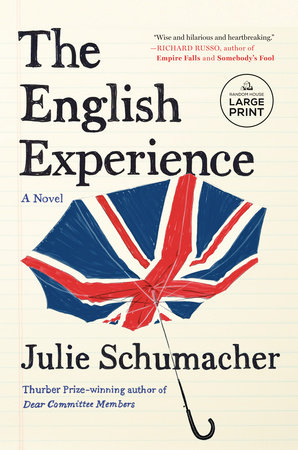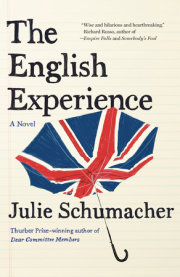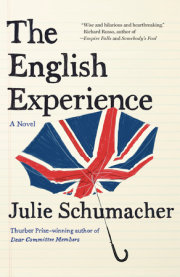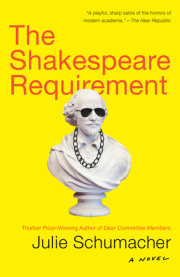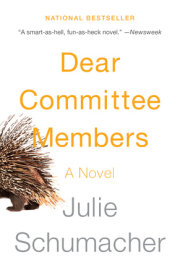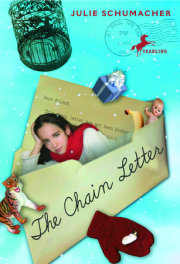One
Jason Fitger, chair of the Department of English at Payne University, found himself summoned, in mid-December, to the office of the new provost. The job of provosts was to create and then disseminate bad news, so he expected her to announce a new punitive measure to be inflicted on his academic unit, which had scarcely survived the crises of the previous years. Instead, after arranging her features into a facsimile of cordial goodwill, she claimed to be presenting him with an opportunity, “truly a plum.”
Fitger braced himself, preparing to hear it.
“You’re probably familiar with our ‘Experience: Abroad’ programs,” the provost said.
Yes, he was familiar with them. He had in fact argued against their existence, first because of the shortage of faculty willing and able to teach internationally, and second because of the absurd and gratuitous colon between the words “experience” and “abroad.”
The provost, adhering to the serpentine rhetorical style of the university’s upper administration, offered some prefatory remarks about the challenging times Payne had endured, and about the tenacity and community spirit that had allowed the university, a shining beacon of higher learning, to prevail.
Fitger retied a shoelace and waited.
“I’m inviting you to teach the Experience: England class this coming January term in London,” she said, leaning back in her leather chair.
The January term at Payne began in less than three weeks, and Fitger hadn’t yet graded his essays from the fall. He told the provost he wasn’t interested.
She seemed not to have heard him. Like all the Experience: Abroad classes, the England seminar, she explained, was interdisciplinary in nature, involving cultural studies, art, religion, history, government, and, of course, literature—but, once he took the course over for himself, he would be free to tweak the curriculum if he chose. The program was based in a lovely neighborhood on the fringes of London, with day trips to Oxford, Stonehenge, and Bath. If she were able to make the trip herself, she would jump at the chance. This was, in essence, a three-week salaried vacation, not to mention an escape from Payne and its weather during the worst of the winter. She certainly envied him.
“There’s no need for envy; I’m not available,” Fitger said.
Really? What made him say that? The provost smiled.
What made him say it? Well, it was true. First, there were various university tasks, most of which had their origin in her office, that he had to take care of; and there were spring semester classes to prepare; and, theoretically, a few meager days for his own vacation, sure to be punctuated by as-yet-unforeseen emergencies that invariably cropped up over the course of any holiday. Besides: Were department chairs, with their Kafkaesque workloads, truly the best candidates for—
The provost waved these objections away. Easy enough to bring his departmental tasks with him. He could probably take care of them on the plane. It was almost 2013, and there was a little invention he might have heard of; it was called the personal computer . . . She leaned toward him over the immaculate expanse of her desk, and Fitger was reminded of a python flexing its coils in preparation for an assault on its prey. She wasn’t talking about sending him to Cedar Rapids, for god’s sake. This was London. Theaters, museums, the changing of the guard, high tea with scones and jam, the queen . . . Everyone loved London.
Jason Fitger did not love London. The last time he’d been there was at least a decade earlier with his then wife, Janet, and his primary memories of the trip involved a sodden cylinder of blood pudding, an evening of poorly timed sex, and rain. Surely there were anglophiles somewhere on the Payne campus, members of the faculty endowed with resources beyond a vague hostility to all things British, who might be willing—if not eager—to teach such a class. What about Ravenel, in Theater?
No. The provost had already asked her.
Sheffield, in Sociology?
Also a no.
Ruiz? Allington?
No and no. Ideally, the course would be taught by the faculty member who had proposed it: Randy Lortimer, in History. “But . . .” The provost paused. “There were . . . complications.”
Complications, as Fitger and everyone else on the Payne campus knew, involved Lortimer being removed from his office in a straitjacket the week before—probably driven around the bend by the paperwork and regulations associated with taking a group of undergrads abroad.
The provost looked at her watch. The students had paid their fees, she said. The tickets were purchased, the housing and schedule and coursework arranged. To be blunt: Payne wasn’t prepared to refund or lose the money. And what else did he have to do over the winter break? While the other faculty she had approached had family and holiday commitments, Fitger (she happened to know) was childless and divorced and, in curmudgeonly fashion, had long lived alone.
Perhaps more to the point: She would be reviewing his department’s budget request at the end of next month. How did he feel about the possibility of receiving—or never again receiving—assistance or protection of any kind from her office?
Fitger took a deep breath and looked down at the carpet. Near his left foot, some sort of insect—a variety of ant or small beetle—was traversing the thread-like fibers, plunging down to the polyester forest floor and laboriously scrambling up again. “Does this class have a syllabus?” he asked.
Of course it did. Every class at Payne had a syllabus. The provost would have her assistant send it to him, along with a packet of information, including profiles of the students, all of whom had been carefully vetted. Travel and other logistics had all been arranged. Was his passport current? Good; it was settled.
They stood. On the flat of the desk between them, Fitger saw a slip of paper with a list of names, all of them crossed out except for his own, at the bottom. The provost wished him a pleasant trip.
Fitger was, as per the provost’s description, childless and divorced, but he didn’t live entirely alone. He and his ex-wife, Janet Matthias, co-owned a dog, trading him back and forth like a surly intermediary between their two homes. A mutt of uncertain lineage, Rogaine was a threadbare, unappealing creature; Fitger had misgivings about his character and disposition and suspected that Rogaine’s feelings toward him were the same.
Now, sitting in Janet’s kitchen with a worn leash dangling from his hand, Fitger explained that, due to the provost’s opinion of him as a friendless recluse, he would be unavailable for canine care for three weeks—from January first to the start of spring term. “What are you making, by the way?” he asked. The room smelled of onions and garlic.
“Vegetarian goulash. With a side of poached chicken for Rogaine.” Janet wiped her hands on her apron and, plucking a pen from a container that was labeled pens, she consulted the large paper calendar on her closet door. A paper calendar, Fitger thought, was a lovely nostalgic touch in a kitchen. On Janet’s version, the dog-custody days were clearly marked. He watched her revise her January schedule.
“Hm.” She frowned. “He’s got a veterinary appointment on the fifteenth. I took him last time, so this one’s your turn.”
Fitger looked at the dog, sitting between them on the tile floor and licking its genitals. “I suppose we could trade. Would you be able to—”
“No. No trading. I’ll call and reschedule him,” Janet said. “So you can take him when you get back. He’s supposed to have his teeth cleaned. And he needs his shots. He should also have his anal sacs milked.”
“Excuse me?”
“Don’t pretend you don’t know about it,” she said. “That’s why he scoots his ass along the rug.”
“Intriguing. Soup to nuts it is, then,” Fitger said. He hated taking the dog to the vet. Normally a brazen, hubristic beast, Rogaine behaved like a demented coward as soon as they walked through the door. He thought about asking Janet to be more flexible in regard to this taking-of-turns but remembered that inflexibility was one of his ex-wife’s more dependable traits.
“It was fairly insulting, the way I was asked to teach the class.” He poked the dog’s left hindquarter with his toe, and Rogaine responded with a half-hearted snarl. “As if I were the last person on campus to be considered.”
Janet opened her refrigerator and burrowed through the crisper drawers. “You probably were the last person.”
“I do have thirty years of teaching experience,” he said, directing his comments to the back of her neck.
She turned around, an odd-looking vegetable in her fist. “And you think that’s a qualification?”
“What do you mean?” Fitger was distracted by the vegetable, a sort of well-coiffed cauliflower that appeared to be ready for a night on the town. “Why wouldn’t it be a qualification?”
“Because—” She tossed the vegetable into the sink. “Teaching abroad is totally different from teaching on campus. You’re hardly nurturing.”
“I need to be nurturing?”
“You’ll be with the students all day,” she said. “You don’t typically like students. And you’re a difficult person. You don’t know how to have conversations. I’m sure I’ve said this before: You’re not well socialized. You lack personal skills.”
“That’s a flattering little sketch.” He watched her savage the odd-looking vegetable with a knife. “What on earth is that thing you’re dissecting?”
“Romanesco. You don’t even relate to the dog very well.”
“The dog has a damaged personality,” Fitger said. “He has a romantic attachment to the arm of my couch. And you know I hate the word ‘relatable.’ ”
Janet pointed out that she had used the word “relate” and not “relatable”—and there were plenty of words that, for reasons of his own which she didn’t want to hear him explain, he seemed to dislike. She lobbed the pieces of vegetable into the pot on the stove and turned toward him. “Jay: You don’t like England. And you’re a terrible traveler. Why would you agree to teach a class about traveling in England?”
“Well, the focus isn’t specifically ‘travel.’ I’m not sure what it is. Why do you say I’m a terrible traveler?”
“I won’t even bother to answer that,” Janet said. “You’re sixty-three years old. You’ve been teaching the same four or five classes for the past twenty years, and you usually dedicate your January term to lying on the couch, complaining that you don’t have time to get your writing done.”
This seemed unfair. Of course he was short on time: he was chairing a department. And why had she referenced his age? She was obviously getting older, too—though he had to admit that her regular tennis games, as well as a recent, somewhat annoying interest in wellness, appeared to keep her in very good shape. “I don’t think you appreciate how much work is involved with running an academic unit. You haven’t had the—”
“Oh, sweetheart,” Janet said.
Fitger startled: his ex-wife didn’t care for endearments or sentimentality. During the early years of their marriage, he had given her an anniversary card and found it ten minutes later, torn in half, in the trash. But she was talking not to him but to Rogaine, who was butting the backs of her knees with his rock-like skull. Fitger watched as she lowered her face toward the dog’s. “Are you asking for a snack before you go? Is that what you want?”
“A snack is always welcome,” Fitger said, speaking for himself as well as the dog. “We’re not in a rush, though. That smells very good, by the way. That vegetable stew . . . with or without chicken.”
Janet ignored him and returned to the stove, both Fitger and Rogaine observing her closely, competing suitors temporarily aligned.
Because Janet enjoyed gossip about the higher-ups at Payne, Fitger told her about his meeting with the new provost in more lurid detail, describing the blood-red color of her fingernails and the oversized photo of the Payne mascot, a prairie dog with miniature forelimbs, that occupied one of her office walls. He shared his hope that, due to his willingness to serve as an academic chaperone in England, the administration would be indebted to English. “We need to hire new faculty, and if I could manage to—”
“I’ve applied for a new job,” Janet said.
“What?” Fitger’s ex was a senior administrator at the Payne University law school. He watched her rinse out a dark blue ceramic bowl. Compared to the dented metal dish he used at Fitger’s, the dog enjoyed much nicer dinnerware here. “What sort of job?”
She turned toward him, brandishing a paring knife like a weapon. “This is confidential, Jay. I haven’t told anyone at work.”
“My lips are sealed,” he said. “Is this about money? You need a raise?”
“Why would that be the first thing you think of?”
“Why wouldn’t it be?” he asked. “You deserve a raise. And a better title. If you’d argued for a better title a few years ago, which I remember telling you to do, you’d be in a stronger position to bargain for—”
“Jay? Forget it. Forget I mentioned it. The topic is closed.” She set the bowl of sliced chicken on the floor for the dog; the meat was gone in three seconds.
Fitger decided not to question her further. Janet was known for a bit of a temper: During one of the low points in their marriage, when she was angry with him about something, she had nailed one of his shirts to the closet door with a staple gun. He had worn it with holes in the sleeves until it disappeared from his wardrobe. He changed the subject. “It must be more than a dozen years since you and I were in England. Do you remember that horrid hotel room we had in London? That sooty little place with the shared bath?”
“I’ve worked hard to erase that entire trip from my memory,” Janet said.
“Understandable.” Fitger nodded. “We had that flat tire in the middle of nowhere in the Wessex Downs. And there was the unfortunate afternoon—no one’s fault, of course—with the roadside sheep. But we weren’t miserable the entire time, were we? The Cotswolds were pleasant, I think.”
“I believe the word you used to describe our weekend in the Cotswolds was ‘harrowing.’ ” Janet filled the dog’s water bowl and watched him drink. “We nearly killed each other in a town called Lower Slaughter. And there was that problem with the laxatives you thought were aspirin.”
“Yes, I’d forgotten about that,” Fitger murmured. Rogaine looked back and forth between them. Fitger often had the impression that the dog was privately evaluating and critiquing their discussions. “Why did we choose England?” he asked. “Ten or fifteen years back, or whenever it was—why didn’t we go to Provence or Norway or Greece, for god’s sake?”
Copyright © 2023 by Julie Schumacher. All rights reserved. No part of this excerpt may be reproduced or reprinted without permission in writing from the publisher.

